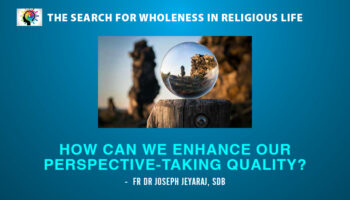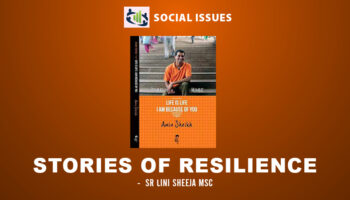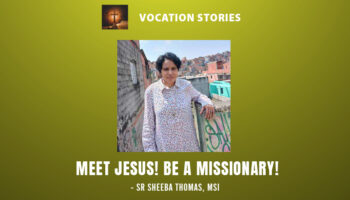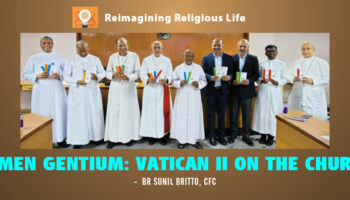This month, we listen to an experienced psychiatrist, counsellor and motivator, with 25 years of work experience in India and in the UK. He is Secretary of the St Luke’s Catholic Medical Guild, Co-chairperson of the Indian Psychiatric Society’s Covid-19 Mental healthcare taskforce, and executive member of the Bombay Psychiatric Society.
Here are our questions and Dr Fabian’s replies. I thank Ms Janina Gomes for contacting Dr Almeida for us. –Editor
- How serious is the situation of mental illness in India?
One in seven people in India were known to be suffering from some mental illness or the other. Anxiety and depression seem to be more common, but there’s also schizophrenia, Obsessive Compulsive Disorder (OCD), bipolar disorder, and much, much more! This year’s ‘World Happiness Report’ found that the pandemic has shaken up lives the world over. And now the numbers have risen to around one in four people. However, the pandemic has also brought mental health and the need to support it, into a sharper focus.
2. Throughout your career as a psychiatrist, you have been working to remove the stigma attached to mental illnesses. Is the stigma a major obstacle to people approaching doctors for help?
Yes! Nine out of ten people with a mental health problem say that stigma or discrimination impacts them negatively. There are different types of stigma: self, public and institutional. It colours our thoughts, feelings and actions with negativity, doubt, fear and shame. Those most impacted by stigma include young people, men, minorities, people in the military and health workers. Yes, associated stigma often leads to delay in seeking help, thereby impacting the treatment outcomes negatively too!
- As a leading consultant in Fortis and Shree hospitals, how has your Catholic faith made a difference to the way you approach your patients and heal them?
My Catholic faith has always helped me maintain my own stability and offer reassurance to my patients and their caregivers. I have always advocated a balanced spiritual approach as against a ritualistic, religious mindset. Trusting in your Creator, expressing your emotions and being grateful by counting your many blessings, even in adversity, can help to heal ourselves faster and better. Understanding that the doctor, his advice and the medicines, too, are all a medium that could be an extension of divine intervention, is how I like to look at it! Mathew 6:26 mentions, “Look at the birds. They don’t plant or harvest or store food in the barns, for your heavenly Father feeds them. And aren’t you far more valuable to Him than they are?”
I also use the lyrics of the meaningful hymn, “In His time…” to give hope, compassion and strength to others. It’s one of my favourites! I have an altar in my consulting cabin, to feel the presence of my God with me as I work, and a rosary in my pocket. My mother always reassures me, saying that she’s praying for all my patients to recover well.
4. You use many approaches apart from medicines and counselling to heal your patients, such as art, drama, summer camps for the young, a mental calendar every year. How do these approaches help?
I am happy that you are always abreast with our many activities… Yes, lack of mental health awareness and associated stigma are two of the main causes that amplify the problems. Through my various initiatives, I attempt to glamorize mental health and normalize our conversations in context to ‘It’s OK to not be OK’….and by championing our patients and caregivers as ‘Positive mental health ambassadors.’ That also gives them a sense of self-empowerment. Our Instagram handle ‘wellspringscounselling’ is full of positive messages and videos to enlighten people in this regard. In fact, every 2nd and 4th Saturday, at 8 pm, we have an insta live programme titled ‘Baaton Baaton Mein’ just to encourage such mental health conversations. Every Saturday, at 6 pm, we have a zoom session called ‘Mann Darpan’ to talk about mental wellness and positivity. These interventions are free. I started this show during the pandemic and the lockdown in May 2020, and we are now heading towards our 100th episode. Our online daycare facility also encourages the patient and caregiver to realize that they don’t have to be dependent on medicines. Small, significant steps towards self-help, support and lifestyle changes can make a BIG difference.
5. What motivated you to become a psychiatrist?
Well, I love answering this question. I always wanted to be a child specialist…because I’m very fond of children. That’s also because my mother ran a home-grown kindergarten school for twenty-five years while she also taught English to girls of the 8th, 9th and 10th grades in a convent school. Before making my final choice for post-graduation after my MBBS, I decided to visit the wards of the pediatric department. However, I was not very comfortable looking around and seeing only mal-nourished, bruised and inactive children. It was time to think again…and then I had my Eureka moment: I realized that my mom, as a wonderful teacher, had impacted the life of so many thousands of students, not only by teaching htm, but more importantly by being there for them; as friend, philosopher and guide. Disturbed students would come home to speak to my mom, and then go back with a smile on their face and a spring in their step! It dawned upon me that If my mom could make such a wonderful difference in their lives, how much more I could then do for the society at large, if I learnt the art and science of dealing with the problems of the mind. Yes, there was no turning back after that! I chose psychiatry as my specialty, at a time when it was still considered taboo, and a non-glamourous field, to say the least. I am happy to see how things have gradually changed, very favourably, over time.
6.You have an outreach to patients of all classes and creeds. How do you meet so many varying needs?
Looking back, I realize that my steadfast psychiatric training at KEM Hospital, Mumbai, gave me immense exposure to the mental illness approaches towards the common man. In these government hospitals, we interact with the poorest of the poor and the marginalized too, besides others from the middle-class. My work experience in the U.K sensitized me to very disciplined, comprehensive, multi-dimensional and team-based approaches to the treatment interventions. Twenty-five years of private practice has taught me that each patient and caregiver is special in their own way. Of course, there are some bitter experiences, but I have also learnt to hold on to the learning lessons from each of my experiences. I always tell my patients: “Focusing on the positives helps you to move from good to better, and finally, the best!”
7.What do you see as your more significant contributions in the field of mental health?
I thank God for blessing me with talents of creativity, innovation, a sense of aesthetics and a strong passion for mental health. During my medical internship days, I also pursued my diploma in fashion designing and technology, besides completing my MBA in hospital administration and healthcare. These skills help me to bring in a certain freshness, the flavour of fellowship and a fun element into my programmes, targeted towards mental health awareness and abolishing associated stigma. Our TTWW (Teachers Training Weekend Workshop) was conducted for ten consecutive years, around the first weekend of July, combining mental health awareness and out-of-the-classroom experiences for teachers, in the rejuvenating, outdoor monsoon setting. The last two years we have been conducting it virtually. So, the learning hasn’t stopped.
This is followed by IMPACT, our annual session specially designed for principals and school administrators. This year our theme was ‘Lifeskills learning and self-development.’ MINDSCAPE, an interschool mental health festival, was a first of its kind initiative, initiated by me, around the world mental health week celebrations, in the first week of October. This year, we gave it an online community theme, and it was amazing to see enthusiastic participation, both from all over India and abroad, including the U.K., the U.S., Canada, Netherlands, Philippines, Kuwait, Dubai, and France. We also conducted a “Wonderful Voices for Mental Health” competition, and had a tremendous outpouring of talent and thoughts, all helping us to sensitize society towards enhanced mental health awareness and positivity. MENTASTIC is our monthly sessions for school children, to help them balance their IQ (Intelligence quotient), EQ (Emotional quotient) and AQ (Adversity quotient). Our annual calendar, INSPIRATIONS, which is out by the first week of January, showcases stories of people having combatted mental health problems wisely and well, besides emphasizing the need for a collective approach to counselling, self-help and support from family and friends.
MANN DARPAN, as mentioned above, is our weekly zoom session on mental wellness and positivity, while BAATON BAATON MEIN is our insta live session every 2nd and 4th Saturday on wellspringscounselling. TWILIGHT TWINKLE is our monthly grief support group, to help people to come to terms with the loss of their loved ones. All these endeavours help me to keep my passion for mental health awareness alive and active!!
8. You are also a convinced Catholic. Does your faith lend you special perseverance and courage in the face of difficult situations?
A doctors’s professional and personal life is not without its share of challenges! Yes, it is especially at these times that my faith comes to my aid. My parents have always taught me to reassure myself in conflict, with the words of Psalm 23: “The Lord is my shepherd, there is nothing I shall want.” The words that ring in my ears often are: “When I find myself in times of trouble, Mother Mary comes to me, speaking words of wisdom: let it be, let it be!” My devotion to Mother Mary is very strong, and that’s how the colours of my clinic are also white and blue. Gospel music gives me immense solace and strength. Another one of my favourite hymns is “God will make a way…” by the very talented Don Moen.
9. You advise people to never give up. How do you deal with really difficult cases? How do you encourage them?
Out of every ten cases I see, at least two or three turn out to be difficult. But it is important for the doctor to decode the difficult in every case, keeping in mind the individual patient and caretakers. Sometimes a better understanding of the problem at hand, and of the available solutions, helps to dissolve the difficulties. A more in-depth history-taking may be required at times. Demystifying the various myths surrounding mental health, and outlining the multi-dimensional approach, involving counselling, medications if required, self-help and support, can make the situation easier. Genetic overlay, irregular follow-ups with the doctor and inconsistent taking of medications; can lead to complications. When we do not get the desired results in about four to six weeks, I make it a point to review the case with my peers and seniors, who have always been obliging, keeping the patient’s best interests in mind. Our ‘Online daycare’ facility—which offers four sessions of basic understanding of mental illness, role of patient and care-giver and many do-it-yourself options for better stress management—has been very effective. Our online support groups, too, offer encouragement and enlightenment, much needed through this journey of recovery and reintegration.
10. Your profession is a high stress one. What do you do to relax and take on the fresh challenges that come your way everyday?
Yes, everyday is a new day, a new playing field to learn, unlearn and relearn the rules of this game called life. I draw strength every day from my balanced spirituality and habits of morning meditation, light exercise and the grace of gratitude, not failing to count my many blessings, both big and small. My family and friends form a large part of my support system, and it is with them that I can unravel my mind, share my anxieties or seek comfort and reassurance. I take pleasure in watching movies, listening to music, doodling, and virtual travelling, now in the post-covid era. Formerly, I would take a weeklong vacation for myself, to de-clutter my mind from all the stress that I tend to take in from others, but my next trip may just have to wait. Getting into the kitchen and trying something new is also very de-stressing for me, except that my wife and mom need to do the cleaning after that! I am blessed to find joy in the simple pleasures of life. Finally, I would like to quote the lines that have always inspired me, so much so, that I have it etched in glass, in my clinic:
“Life’s battles don’t always go to the stronger or the faster man,
Sooner or later, the one who wins,
Is the one who THINKS he CAN!!”
Dr. Fabian Almeida
To subscribe to the magazine, click Subscribe





